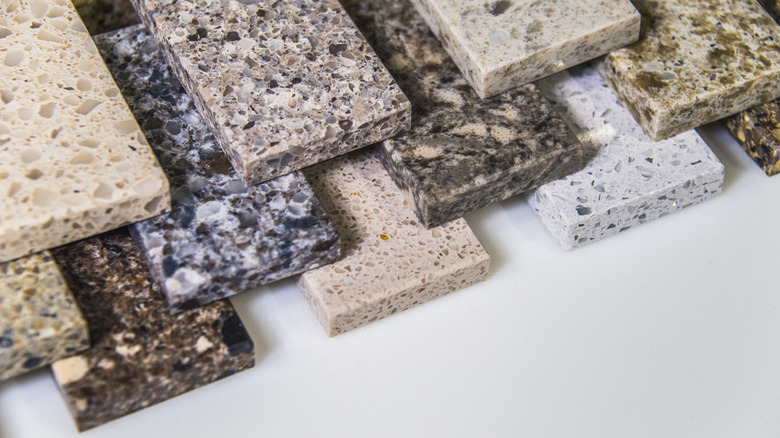The Biggest Difference Between Quartz And Granite Countertops
Countertop materials set the tone in home kitchens, with quartz and granite staking claims in countless cooking kingdoms across the globe. At first glance, the appearance may seem indistinguishable, especially because quartz contains a high percentage of natural stone. But distinct differences between the two materials affect various aspects of a kitchen, including the important process of food preparation.
First, it helps to know what distinguishes granite and quartz countertops. Granite is a completely natural hard stone mined from underground, open-pit quarries. The process of extracting stones for building materials dates back thousands of years, explains National Geographic, and includes the use of granite blocks and limestone for building the Great Pyramids of Egypt. Today's use of granite for countertops requires smaller slabs of genuine stone that are finely polished, notes HGTV. Quartz, on the other hand, is a natural hard mineral but is considered an engineered stone in countertops, per The Kitchn. That's because it's ground up and mixed with about 10% resins and polymers, as well as pigments for color.
Each material has its own implications when prepping food in your kitchen, including durability and food safety.
Granite versus quartz countertops for meal prep and safety
Both quartz and granite are undeniably durable, making it fun to chop, slice, and dice with abandon. The Kitchen Store confirms that both types of countertops can handle everyday direct cuts from kitchen knives without scratching but cautions that constant chopping with strong force risks damaging both surfaces and knives. Acidic foods can also leave dull spots on countertops, according to Let's Get Stoned. But quartz holds up better to stress and cracking, ranking a 7 out of 10 on the Moh's scale of mineral hardness, via Bob Vila.
Food safety tops the list of considerations when preparing meals on your kitchen counter. The CDC recognizes at least 250 foodborne diseases caused by bacteria, parasites, and viruses. You certainly don't want your countertops to harbor any sinister culprits, so Keystone Granite and Tile explains how porosity comes into play. Natural stone surfaces like granite are generally more porous than quartz, especially when not routinely sealed. Quartz, as a manmade material, is nonporous and thus easier to protect against bacteria.
However, a study from the Hospitality Institute of Technology and Management, cited by Keystone, showed that both granite and quartz are safe from bacteria when properly cleaned with ordinary dishwashing soap, rinsed with water, and sanitized with white vinegar.
Both materials are excellent choices for bringing sophistication and warmth to a kitchen, so weigh the differences based on your food-prep habits — and consider using cutting boards for extra surface protection.

